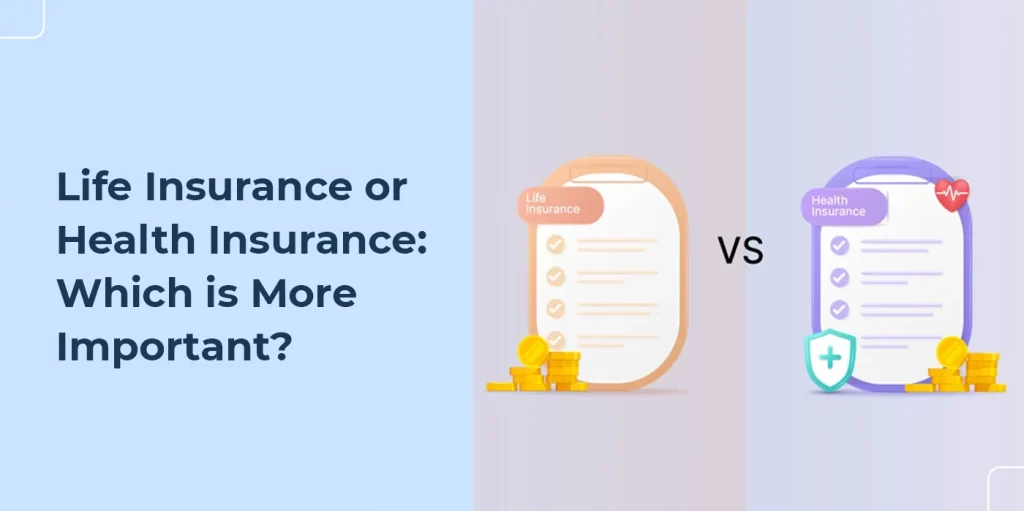Insurance plays a vital role in financial planning and security. Two of the most commonly discussed types are life insurance and health insurance. While life insurance is designed to provide financial security to your loved ones in the event of your passing, health insurance focuses on covering medical expenses and maintaining your well-being. Both types of insurance serve different purposes but are equally significant in providing peace of mind. However, the priority between life insurance and health insurance depends on individual circumstances. In this blog, we’ll explore the unique benefits of each and discuss when one might be prioritized over the other.
Life Insurance: Protecting Your Loved Ones
Life insurance is about ensuring that your family and dependents are financially protected if you are no longer around. Here are some of the key reasons why life insurance might be a priority:
1. Financial Security for Dependents: The primary benefit of life insurance is the financial safety net it provides to your family. In the unfortunate event of your passing, life insurance ensures that your dependents receive a lump sum or regular payouts to maintain their standard of living.
2. Income Replacement: If you are the primary breadwinner, life insurance can replace lost income for your family. This coverage helps your loved ones meet daily expenses, mortgage payments, and other financial obligations without facing a sudden economic crisis.
3. Funeral Expenses: Funerals can be expensive, and a life insurance policy can cover these costs, relieving your family of the financial burden during an emotionally challenging time.
4. Paying Off Debts: Many individuals have outstanding loans or mortgages. Life insurance can help pay off these debts, ensuring that your family is not left struggling to cover payments after you are gone.
5. Business Protection: For business owners, life insurance can be used to protect the company. A policy can cover business debts, facilitate a smooth transition of ownership, or ensure that the business remains operational after the loss of a key individual.
Health Insurance: Protecting Your Well-being
Health insurance is designed to take care of your medical needs, both routine and unexpected. Below are some key benefits of prioritizing health insurance:
1. Medical Expense Coverage: Health insurance helps cover the costs of doctor visits, hospital stays, medications, surgeries, and other medical expenses. This coverage ensures that you don’t have to worry about large out-of-pocket expenses in case of health emergencies.
2. Preventive Care: Many health insurance plans offer preventive care services like annual check-ups, vaccinations, and screenings. These services help detect potential health issues early, making it easier to manage and treat them effectively.
3. Chronic Illness Management: Health insurance provides coverage for managing chronic illnesses like diabetes, hypertension, or heart disease. Regular monitoring and prescribed treatments are often included, helping individuals manage their conditions without financial stress.
4. Emergency Funding: In emergencies, such as accidents or sudden health deterioration, health insurance provides immediate coverage. This ensures that you receive necessary medical care without delay, regardless of the costs involved.
5. Mental Health Support: Many health insurance policies now cover mental health services, including therapy, counseling, and mental health treatments. This support ensures that individuals can seek help without worrying about the financial burden.
Key Considerations While Choosing Insurance
Deciding between life insurance and health insurance can be challenging. Here are some critical factors to consider when prioritizing:
1. Age: As individuals age, life insurance becomes increasingly important to ensure financial stability for dependents. However, health insurance is crucial at every age to cover medical needs.
2. Family Status: Those with dependents, such as young children or elderly parents, may prioritize life insurance to secure their family’s future in case of unforeseen circumstances.
3. Health Conditions: Individuals with chronic health conditions might prioritize health insurance to manage medical expenses. Health insurance offers a safety net for regular treatments and emergency care.
4. Income Level: For those with limited financial resources, health insurance may be the primary priority to cover routine and unexpected medical expenses, preventing financial strain.
5. Occupation: People in high-risk professions, such as construction workers or law enforcement personnel, may need additional life insurance coverage due to the higher likelihood of occupational hazards.
Scenarios: Which Insurance Takes Priority?
Here are some scenarios where one type of insurance may take precedence over the other:
1. Young Family with Dependents: In a scenario where a young family has dependents, life insurance may take priority. It offers financial security for the spouse and children, ensuring they have a stable future if anything unexpected happens to the primary earner.
2. Self-Employed Individuals with Pre-existing Conditions: A self-employed individual with pre-existing health conditions might prioritize health insurance. Having coverage for medical expenses can protect personal finances and avoid significant out-of-pocket costs.
3. Retiree with Pension: A retiree with a stable pension may lean towards health insurance as a priority. With no active income to replace, health insurance ensures that medical expenses are covered, helping maintain a comfortable lifestyle in retirement.
4. Single Individual with No Dependents: In this case, health insurance may suffice since no dependents are relying on financial support. Ensuring good health and access to medical care takes precedence in this scenario.
Conclusion
In conclusion, both life insurance and health insurance are crucial components of a sound financial plan. Life insurance offers peace of mind by safeguarding the financial future of your loved ones, while health insurance ensures that you have access to quality healthcare without the worry of high costs. The choice between the two depends on individual circumstances, such as age, family status, health conditions, income level, and occupation.
For guidance on choosing the right insurance coverage, trust RSH Oman Insurance Agents—the best Insurance Agent in Muscat. With years of experience and expertise, we are dedicated to helping you make informed decisions to protect your future and well-being.


